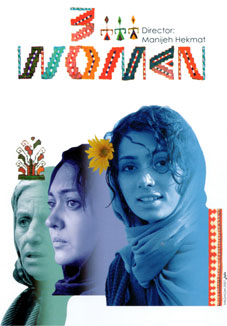
3 ZAN (THREE WOMEN)
Iran, 2008, 94 minutes, Colour.
Niki Karimi.
Directed by Manijeh Hekmat.
A vigorous film about women from the director of Women’s Prison.
While staying within the bounds of the restrictions of dress, position and influence of women in contemporary Iran, this is a glimpse of three generations of women, women who are becoming stronger and more independent in each generation. It is a dramatic view of tradition, of current enterprise and of the possible future.
The action takes place over only a few days. The focus is on the busy woman, Minou (Niki Karimi), involved in carpet making and an expert in authenticity verification to detect illegal sales out of the country. Her mother is senile, due to go for a doctor’s appointment but, when her daughter is caught up in stopping a sale, she wanders off with a carpet. She takes a bus back to her village. She represents the traditional past.
Minou has also lost her daughter, Pegah, and discovers to her dismay that Pegah had been failing courses at university for several terms and had dropped out, that she has an apartment as well as a job as an industrial photography. As Minou goes to visit friends and her daughter’s associates, she discovers more about herself and her attitudes than about her daughter.
Meanwhile Pegah has driven on an impulse out into the countryside, gives a lift to a young archaeologist, discusses serious matters with him. They also take care of a woman who is ill after an illegal abortion and carry her back to her village where the elders discuss stoning her because of her sin. Freer in spirit than her mother, she has a sense of responsibility which ensures a stronger future.
Then the film stops. It is not as if we cannot appreciate what has happened and what will happen to the three women. But, the film just stops.
1.A woman director? Women’s themes? In contemporary Iran?
2.The Teheran settings, the streets and the traffic, the offices, museums? The contrast with the open spaces, the desert, the mountains, the villages? The musical score?
3.The title, the three generations of women? The central focus on Minou? The older generation, the younger generation?
4.Minou’s story: caring for her mother, caring for her daughter? Her being a weaver, her expertise in carpets? Her repairing carpets? Not wanting them to be sold illegally? The discussions with the minister, with the museum managers? Taking her own initiatives? The urgency of time – and the possibility of carpets being smuggled out of the country? The reaction of the authorities, their caution, wanting her to take time?
5.Minou’s busy life, taking her mother to the doctor, the phone calls, the carpets, leaving her mother? Her mother’s disappearance?
6.Her search for her mother, discovering her daughter was missing? Her range of friends and contacts? Going to see them, the discussions, trying to work out where her mother had gone? Where her daughter could be?
7.The old woman, senility, eighty-one, with the carpet, leaving the vehicle, going to get the bus, travelling, sleeping, going back to the village, her going to sleep? The possibility of her being found? Her having a carpet?
8.Pegah, as daughter, not telling her mother about her studies and failing, nor her job? Her mother going to see her friends, going to the university, finding out that her daughter had dropped out? Going to see the musicians? Her finding out about her job, industrial photographer? Her finding out about her apartment, going to visit it?
9.Minou, her trying to understand her mother, concern about her and her old age? Concern about her daughter, realising she knew very little about her daughter? Her mission to find out the truth and reconcile?
10.The journey of the daughter, driving aimlessly, picking up the archaeologist, their discussions about the meaning of life, going to the dig, his showing her the bowl, people eating from it five thousand years earlier, her sardonic reactions? Her taking photographs? Going to the village, staying? Going back to the dig? Discovering the woman who had had the abortion, taking her to her village, observing what happened, the elders meeting, the discussion, wanting to stone her because of her crime? Attending the funeral of the woman? Her sense of responsibility? Her friendship with the archaeologist, talking with him? Some kind of answer to her quest?
11.The archaeologist, young, his being a dentist, Pegah and her toothache and their discussions, his love for archaeology, examining the past, trying to understand, his own sense of responsibility?
12.The range of people that Minou visited, the old friend, the old women, the students? A cross-section of the population?
13.The film stopping, leaving the audience to effect the reconciliation – and anticipate some kind of future for the three women?